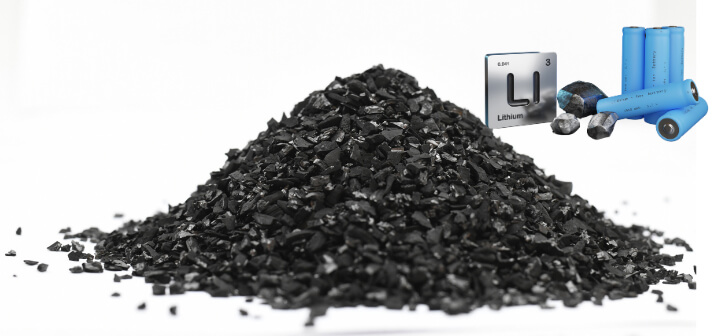This article will provide a detailed overview of the role of activated carbon in lithium mining, covering its applications and the key processes where it is utilized.

What is Lithium Mining?
Lithium mining refers to the extraction of lithium, a light and highly reactive metal essential in producing lithium-ion batteries and other applications. Lithium is found in two primary forms:Brine Deposits: Lithium-rich brines are found in salt flats, primarily in countries like Chile, Argentina, and Bolivia. Brine extraction involves pumping lithium-rich water from underground and evaporating the water to concentrate the lithium.
Hard Rock Deposits: Lithium is also extracted from minerals such as spodumene, petalite, and lepidolite. This involves crushing and processing the ore to extract lithium compounds.
.jpg)
Applications of Activated Carbon in Lithium Mining
Activated carbon is widely used in the lithium mining process due to its remarkable ability to remove impurities, improve recovery rates, and enhance the overall efficiency of lithium extraction. Below are the key roles it plays:1. Pre-Treatment of Brine
Before lithium can be extracted from brine deposits, the raw brine must be purified to remove suspended solids, organic matter, and other contaminants. Activated carbon is highly effective in:Adsorbing Organic Impurities: Organic contaminants in brine can interfere with downstream processes. Activated carbon traps these molecules, ensuring cleaner brine for lithium recovery.
Improving Process Efficiency: By removing impurities early in the process, activated carbon reduces the load on subsequent processing steps, saving time and costs.
2. Impurity Removal in Brine Extraction
In brine-based lithium extraction, several competing ions, such as boron, magnesium, and calcium, can reduce lithium recovery efficiency. Activated carbon selectively adsorbs these ions, allowing lithium to remain in the solution for further processing.3. Hard Rock Lithium Processing
In hard rock mining (e.g., spodumene mining), activated carbon is used during the chemical extraction process:Leaching Solutions: During acid or alkaline leaching, impurities such as iron and manganese are adsorbed by activated carbon.
Purification Stages: Activated carbon helps refine lithium carbonate or lithium hydroxide by removing residual impurities.
4. Recycling Lithium from Batteries
Activated carbon also finds applications in recycling lithium-ion batteries:Hydrometallurgical Processing: Used to adsorb impurities like cobalt, nickel, and manganese during lithium recovery from spent batteries.
Selective Adsorption: Activated carbon ensures high-purity lithium recovery by removing competing ions and contaminants.
.jpg)
Conclusion
Activated carbon is an invaluable material in lithium mining and extraction, offering unparalleled benefits in impurity removal, process efficiency, and sustainability. From purifying lithium-rich brines to enhancing hard rock processing and even recycling lithium from used batteries, activated carbon ensures high-quality lithium recovery while minimizing environmental impact and operational costs.As the demand for lithium continues to grow with the global shift toward renewable energy and electric vehicles, innovations in activated carbon technology will further enhance its role in the lithium industry. Contact us to learn more about tailored activated carbon solutions for your lithium mining needs.

